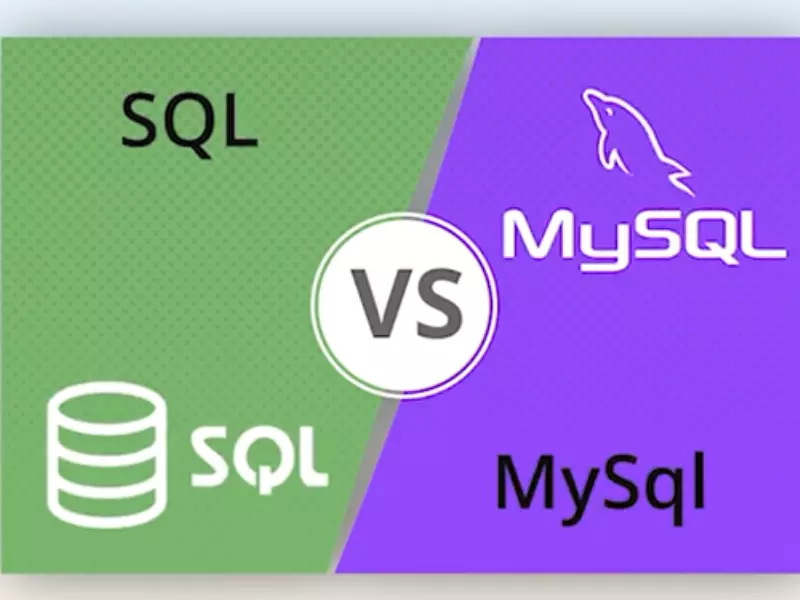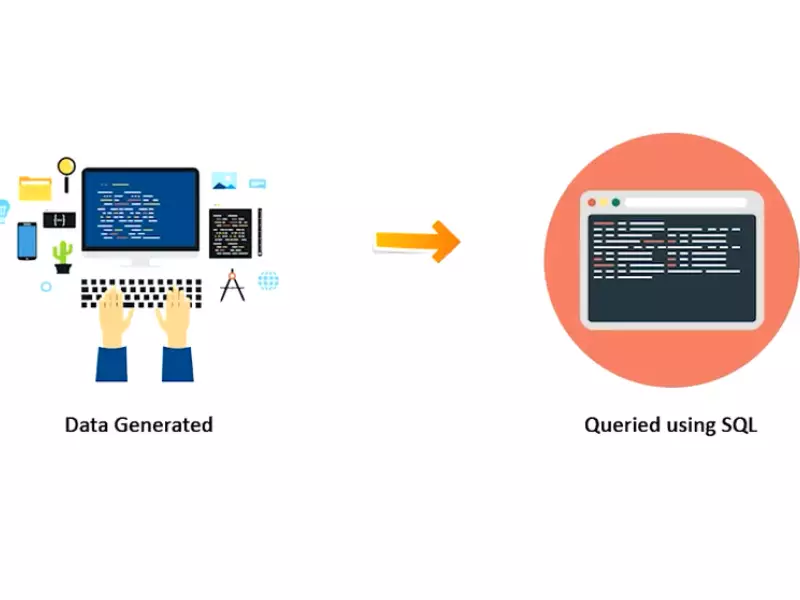In the realm of database management, two terms frequently emerge at the forefront: SQL and MySQL. While both are instrumental in the structuring, manipulation, and querying of data, their roles and applications in the digital world significantly differ. This distinction, often overlooked, is crucial for developers, database administrators, and businesses aiming to optimize their data management strategies.
SQL, or Structured Query Language, is the standard language used for managing and manipulating databases. MySQL, on the other hand, is a database management system that utilizes SQL as its underlying language. Essentially, SQL is the foundation for querying and editing information stored in a database, while MySQL provides a system for managing and facilitating access to this data.
The differentiation between SQL and MySQL extends beyond their basic definitions. SQL serves as a universal language for interacting with relational databases, regardless of the specific software. MySQL, a product developed by Oracle Corporation, offers a comprehensive solution for database management, including tools for data storage, modification, and retrieval. Understanding these distinctions is key to leveraging the full potential of database technologies in various applications.

SQL Basics
Definition and Role
Structured Query Language (SQL) is the standard language for relational database management systems. SQL statements are used to perform tasks such as update data on a database or retrieve data from a database. The language is incredibly powerful in managing structured data, where there are relationships between different data variables.
SQL plays a pivotal role in both the creation and maintenance of modern databases. It allows users to create, manipulate, and query relational databases. Without SQL, interacting with database systems would be significantly more complex and less efficient.
Language of Databases
SQL is often referred to as the language of databases because it is used to communicate with databases. Through SQL, users can perform various operations such as:
- Creating databases and tables
- Inserting data into databases
- Querying the database for specific information
- Updating existing data
- Deleting data
These capabilities make SQL an indispensable tool for database administrators and developers alike.
MySQL Overview
Introduction to MySQL
MySQL is an open-source relational database management system (RDBMS) that uses SQL as its query language. Being open-source means that it is available for free with its source code accessible to the public. MySQL is popular for its reliability, scalability, and ease of use.
MySQL supports various database functions such as transactional and non-transactional requirements, making it a versatile tool for web applications, data warehousing, and logging applications.
MySQL as a Database Management System
As a database management system, MySQL provides users with tools to manage database structures, including the storage, modification, and retrieval of data. It stands out for its compatibility with all major hosting providers, ease of use, and support for large databases, making it an excellent choice for both small and large projects.
MySQL’s architecture allows it to handle multiple database connections simultaneously, which is a critical requirement for dynamic websites that serve thousands of users at any moment.
Core Differences
Nature and Purpose
The primary difference between SQL and MySQL is their nature and purpose. SQL is a language designed for accessing, querying, and managing data in a relational database. On the other hand, MySQL is an RDBMS that implements the use of SQL to manage the database’s operations.
SQL: Language vs. MySQL: Software
SQL is a standardized programming language that is used across various database platforms. MySQL, however, is software that uses SQL to manage the databases it hosts. This distinction is crucial for understanding how data management and database functionalities are executed.
Application and Use Cases
The application and use cases of SQL and MySQL also differ. SQL is used to query and operate on the data within any SQL-compatible RDBMS. MySQL, being one of those RDBMS, finds its use in web development, data warehousing, and log processing, among other applications.
Technical Distinctions
Syntax and Commands
While MySQL uses SQL as its query language, there are variations in syntax and commands across different RDBMS that use SQL. This means that while the foundational aspects of SQL remain consistent, MySQL may have specific functions and extensions that optimize its usability and functionality.
Data Handling Capabilities
The data handling capabilities of SQL and MySQL also showcase significant differences. SQL, as a language, provides the framework for data manipulation (DML) and data definition (DDL) commands. MySQL, leveraging SQL, enables these operations within its system but also offers additional features such as transaction control, indexing, and caching to enhance performance and manageability.

Accessibility and Compatibility
Platform Support
SQL, being a language, is universally supported across various database management systems (DBMS), making it highly accessible regardless of the platform. It can be used with multiple systems such as MySQL, PostgreSQL, SQL Server, and Oracle, among others. This widespread support ensures that knowledge of SQL is applicable across a broad spectrum of database environments.
MySQL is known for its impressive platform compatibility, running on Linux, UNIX, Windows, and MacOS. This versatility makes MySQL a preferred choice for developers working in diverse computing environments.
Integration with Other Technologies
MySQL seamlessly integrates with a variety of programming languages and technologies including PHP, Java, Node.js, Python, and C++, enhancing its utility in web development and application building. This ease of integration facilitates the creation of dynamic, data-driven applications with minimal hassle.
Performance and Scalability
Speed and Efficiency
MySQL shines in terms of speed and efficiency, particularly in web applications. Its design and architecture allow for fast data retrieval and high-performance output, even under substantial loads. This efficiency is crucial for applications requiring real-time access to data.
Handling Large Databases
Both SQL and MySQL are designed to handle large databases efficiently. However, MySQL’s architecture and features such as table partitioning and indexing make it exceptionally well-suited for managing extensive datasets without compromising on performance.
Community and Support
Developer Community
The developer community for both SQL and MySQL is vast and active. Numerous forums, websites, and social media groups are dedicated to SQL and MySQL, providing a platform for support, knowledge exchange, and collaboration.
Documentation and Resources
MySQL benefits from extensive documentation available through its official website and third-party resources. This comprehensive support material aids in troubleshooting, learning new features, and optimizing database performance.
Licensing and Costs
Open Source vs. Proprietary
MySQL is available under an open-source license, making it free to use, modify, and distribute. This open-source nature contrasts with some other database systems that operate on a proprietary basis, requiring licenses for use.
Cost Implications for Businesses
For businesses, the cost implications of choosing MySQL over a proprietary system can be significant. The absence of licensing fees with MySQL can lead to substantial savings, particularly for startups and small businesses. However, companies requiring advanced features and support may opt for paid versions or enterprise editions of MySQL, which offer additional functionalities and dedicated support.
Security Features
Authentication and Encryption
Security is a paramount concern in database management. MySQL offers robust authentication mechanisms and supports SSL encryption, ensuring that data is securely transmitted and stored. SQL, as a language, provides commands to manage user permissions, enhancing security at the database level.
SQL and MySQL Security Measures
Both SQL and MySQL come with built-in security features to protect against unauthorized access and data breaches. SQL injections, one of the most common security threats, can be mitigated through proper coding practices and the use of prepared statements in MySQL.
Real-World Applications
Case Studies: SQL vs. MySQL
Numerous global companies and websites rely on MySQL for their database needs, including Facebook, Twitter, and YouTube. These case studies illustrate MySQL’s capability to manage vast amounts of data efficiently, ensuring high availability and performance.
Industry Preferences
Different industries have varying preferences based on specific needs. For instance, e-commerce platforms often prefer MySQL for its reliability and performance in handling transactions and customer data. In contrast, corporate environments might lean towards SQL Server for its integration with other Microsoft products.
Choosing Between SQL and MySQL
Factors to Consider
When deciding between SQL and MySQL, factors such as compatibility, performance needs, scalability requirements, and cost should be considered. The choice largely depends on the project’s specific needs and the existing technology stack.
Recommendations for Different Needs
- For web development and applications requiring robust performance and scalability, MySQL is highly recommended.
- For projects within a Microsoft ecosystem, a DBMS like SQL Server, which uses SQL, might be more suitable due to its seamless integration.
- For learning and academic purposes, mastering SQL provides a solid foundation in database management, applicable across various DBMS.
Frequently Asked Questions
What is SQL?
SQL, short for Structured Query Language, is a standardized programming language designed for managing and manipulating relational databases. It enables users to create, modify, query, and control access to databases through a variety of commands and functions.
How does MySQL differ from other databases?
MySQL differentiates itself as an open-source relational database management system. Its popularity stems from its reliability, scalability, and compatibility with numerous operating systems. Additionally, MySQL supports a wide range of applications, from web-based applications to large-scale enterprise solutions, making it a versatile choice for developers.
Can SQL be used without MySQL?
Yes, SQL can be used without MySQL. SQL is a language that can interact with any relational database management system (RDBMS), such as PostgreSQL, Oracle, or SQL Server. MySQL is just one of many systems that implement the SQL language for database management.
Is MySQL easier to learn than SQL?
Learning SQL is foundational for interacting with any relational database management system, including MySQL. Since MySQL uses SQL as its query language, understanding SQL is essential. However, MySQL is known for its user-friendly interface and comprehensive documentation, making it accessible for beginners.
Conclusion
The distinction between SQL and MySQL is a fundamental aspect of database management that influences the development, deployment, and maintenance of database systems. While SQL lays the groundwork for database interaction through its universal language, MySQL provides a robust platform for implementing these interactions in a practical, efficient manner. Recognizing the unique roles and capabilities of each is crucial for anyone involved in database administration, development, or data analysis.
Embracing both SQL and MySQL in their respective capacities enables businesses and developers to harness the full potential of their data. As technology evolves, the importance of understanding these tools and their differences remains paramount in the pursuit of efficient and scalable database solutions.
